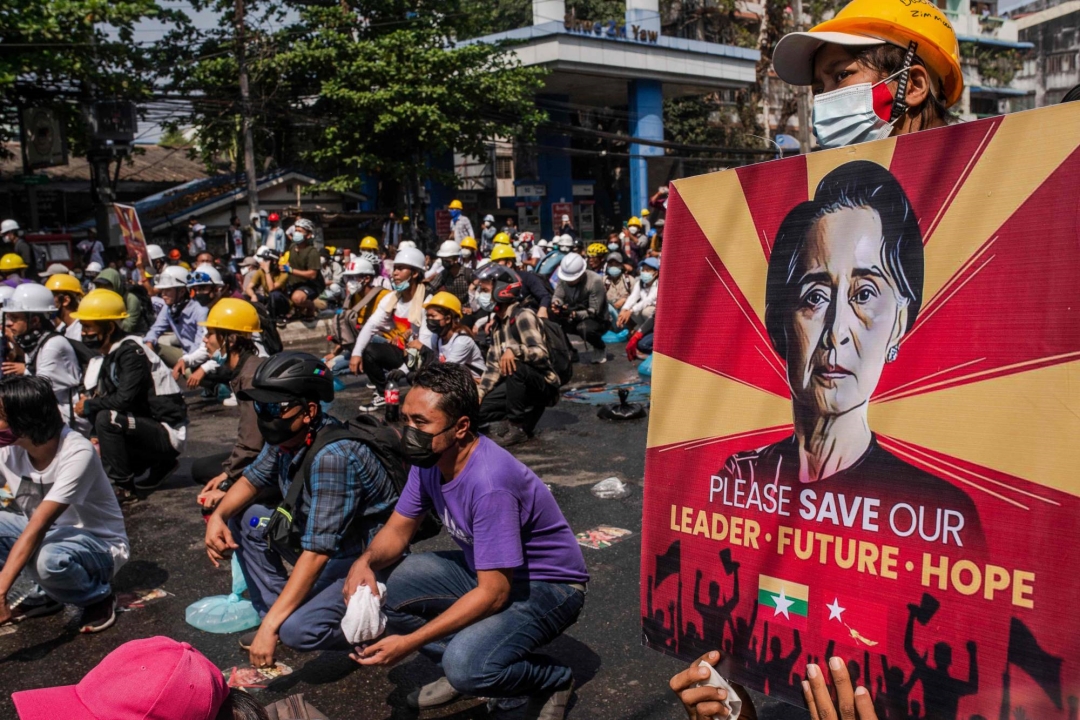
Protesters take part in a demonstration against the military coup in Yangon on March 2, 2021. – AFP photo

LAST week, I suggested that Malaysia should seek membership of the G20 to enable our top political leaders and diplomats to play an active role in international affairs on the world’s stage.
I noted the absence of a Malaysian delegation at the recent G20 summit in Bali, and argued how they could have benefitted tremendously from personally interacting with the leaders from many countries whose combined population represents 80 per cent of the world’s.
Specifically, the Malaysians could have conveyed to the Chinese, in a language as diplomatic as possible, that their fishermen have been fishing in our territorial waters in the South China Sea.
At the same time, they could have been proactive in raising the possibility of a joint-venture project between their fishermen and our fishermen in terms of exploiting the marine resources for mutual benefits.
It would have been unnecessary for the Malaysian delegates to remind the Chinese of the decision of the International Court of Justice (ICJ) which, in July 2016, had ruled under the international law, that China has no right to claim that the waters surrounding their man-made islands and the waters within the nine dash line in the South China Sea are their territorial waters.
In other words, these are still international waters.
Our stance towards China/Taiwan relations
Within this context, I am addressing the newly-minted Malaysian Minister for Foreign Affairs over a couple of matters relevant to his ministry.
Firstly, how do we Malaysians see the China/Taiwan issue? At present, Malaysia remains an important trading partner of both, differing political ideologies notwithstanding.
In this context, I think ordinary Malaysians would like to know how Malaysia will treat China’s claim of ownership of Taiwan and its threat to take it back by force, if necessary.
What if China were to use the template similar to that used by Russia in the Donbas region of Ukraine? Is Malaysia prepared for any eventuality: what would be our orientation when it comes to the crunch, or shall we cross the bridge when we come to it?
Myanmar
Secondly, how would Malaysia help Asean in dealing with Myanmar so that its military rulers would appreciate Asean’s yearning for peace and security in this region?
Is there a fresh idea that Malaysia would like to propose to its Asean partners for adoption in dealing with the military government there; for example, a policy of engagement rather than one of snubbing its leaders by not inviting the junta leaders to attend important meetings of Asean without formally recognising the justification for their coup d’etat against the elected government of Daw Aung San Su Kyi?
Specifically, will Malaysia propose to its partners to engage with the military rulers suggesting that they hold peace talks with the tribes living in the northern borders? Those tribes are being gunned down mercilessly.
In the past Malaysia had been acting in concert with its Asean partners in dealing with the military government of Myanmar, fully conscious of the necessity of observing the principle of non-interference in the internal affairs of each member country. Has the time not come to review this kind of approach so as to enable the junta to come half way to a rapport with the rest of Asean countries?
What is it that needs to be done so that the violation of the human rights of these indigenous people of Burma will be eventually reduced to zero?
It would be great for Malaysia’s image in the world if our new Foreign Minister would be initiating humanitarian missions from Malaysia including representatives of non-governmental organisations (NGOs) from Sabah and Sarawak to be sent to the northern region of Myanmar in order to meet with the tribes such as the Naga, the Kachin, the Karin, the Mong, the Ma, and so on.
Malaysians have been sending humanitarian missions to Palestine. By the same token, Malaysia should send similar missions to other parts of the world, including Myanmar.
I don’t see why a mercy mission to Myanmar cannot be organised if the military rulers in Myanmar are told that these missions are non-political; they are purely of humanitarian nature.
The ‘Sabah Claim’
Thirdly, how about the claim to Sabah by the descendants of the Sultan of Sulu?
Now that each of the countries has a new government, is it not the time for the Republic of the Philippines and the Federation of Malaysia to sit down and hold a cordial conversation on the ‘Sabah Claim’? That done, both countries will continue trading with each other in peace. Setting aside geopolitical interests is imperative for a bigger picture: the security in that part of the Sulu Sea.
These two member countries of the Asean must show to the world that they are able and willing to play an important part in terms of impressing on USA and China to think in terms of working together, rather than to pursue primacy in world affairs when the Asean countries need peace of mind in their daily lives, free of worries about a war between China and Taiwan with support from USA.
Official visit to the republic
The Philippines and Malaysia are friends to everyone else and an enemy of none, to paraphrase the sentence used by the President of the Philippines, Bongbong Marcos, in one of his speeches which I heard a couple of months ago.
On that basis, perhaps our new Foreign Minister may plan a visit to the Philippines paving the way for a visit later by our Prime Minister, or even of our King.
Why not?
